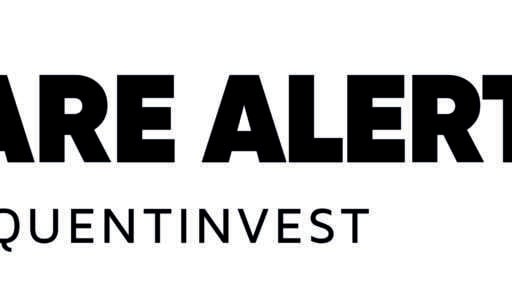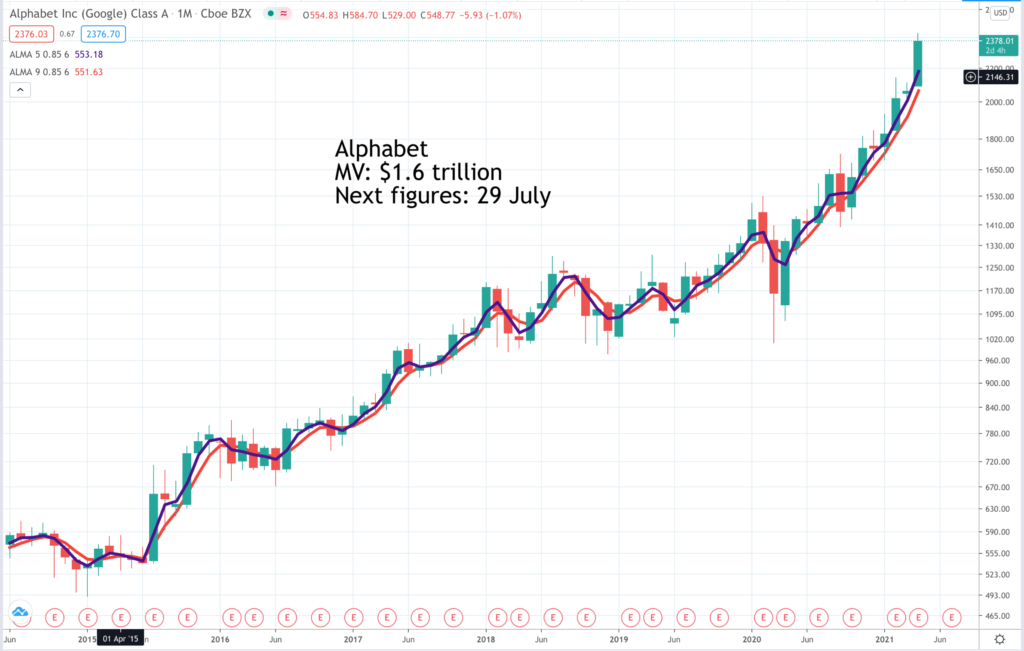
How share buybacks are driving strong shareholder returns at Alphabet/ Google, Home Depot, Mettler-Toledo and O’Reilly Automotive

Alphabet. GOOGL Buy @ $2374. Times recommended: 18. First recommended: $985.19. Last recommended: $2237
Home Depot. HD. Buy @ $321. Times recommended: 1. First recommended: $319
Mettler-Toledo International. MTD. Buy @ $1316. Times recommended: 4 First recommended: $1145. Last recommended: $1312
O’Reilly Automotive. ORLY. Buy @ $532. Times recommended: 1 First recommended: $506
First off, it is staggering reading the latest quarterly report from Alphabet, aka Google, highlighting the role this company plays in our lives. Life without Google is becoming almost unimaginable. The company sees 100s of millions of searches every day just for Covid and health care related information. This is creating a business that is scaling at a ferocious rate. The group plans to spend $7bn on data centres this year just in the US to support a cloud computing business, which grew 46pc in the quarter.
Just a flavour of what is going on at Google. “Take Dick’s Sporting Goods. Throughout the pandemic, they accelerated curbside pickup, pickup in-store and ship-from-store fulfillment options in Search. This approach contributed to 100pc year-over-year increase in e-commerce sales in 2020. And just recently, they activated YouTube to build awareness for new store concepts. Michaels, the arts and craft store also activated their omnichannel fulfillment approach using Search and Maps. And to meet surging demand for art supplies, they used TrueView for action to tap into the vast number of arts and craft searches happening on YouTube. In 2020, their e-commerce sales were up 350pc.”
Years ago a financier called Jim Slater explained his preference for investing in small companies by saying elephants can’t jump. He didn’t know about Google. “For the first quarter, our consolidated revenues were $55.3bn, up 34pc, or up 32pc in constant currency, reflecting elevated consumer activity online and broad-based increases in advertiser spending within Google Services, as well as ongoing strength in Google Cloud….Operating income was $16.4bn, up 106pc. And our operating margin in the quarter was 30pc.
This is real money. “Operating cash flow was $19.3bn, with free cash flow of $13.3bn in the quarter and $50.7bn for the trailing 12 months. We ended the first quarter with $135bn in cash and marketable securities.”
The first use of this money is to keep growing the business. “In terms of investment levels within Google Services, we still intend to invest aggressively to support the extraordinary opportunities we see.” Similar comments apply to Google Cloud and Other Bets, which includes things like Waymo autonomous driving.
The company is also looking after shareholders in an amazing way with an additional $50bn earmarked for share buybacks. It is easy to get blasé with these big numbers but that is a phenomenal amount and certainly enough to move the needle for shareholders even with a business valued at $1.6 trillion.
Now I want to look at three other companies, also in the QV for Shares portfolio, where share buybacks have been major drivers of their outstanding share price performance. Home Depot is a gigantic US-based diy business, which has been investing for decades in great products, great prices and great locations. It is the go-to destination for diy in North America. Lockdown has provided a following wind because so many people at home with less to do have been taking a critical look at their surroundings and deciding to upgrade both in the house and in the yard, as Americans call gardens. HD is no longer just a North American business with operations in 40 markets.
The group uses its financial strength to look after shareholders. In calendar 2019 it returned $13.5bn to shareholders in the form of dividends and share buybacks. In 2020 the group paid $6.5bn in dividends but suspended the share buyback programme in March. As it turns out the group has enjoyed a bumper year with sales growth in 2020 equalling all the group the group achieved in its first 19 years. My guess is that shareholders can expect a bumper 2021.
Another company, with some similarities to Home Depot in terms of being a category killer with a strong market position is O’Reilly Automotive. O’Reilly does for car owners what Home Depot does for home owners and again it does it very well. The company had a strong 2020. “2020 represents our 28th consecutive year of comparable store sales growth, record revenue and operating income, and none of the 27 preceding years was anything like 2020. Now we will cover our fourth quarter results and the full year expectations supporting our 2021 guidance. Our comparable store sales for the fourth quarter grew at 11.2pc.
Like Home Depot O’Reilly is able to say. “We offer a compelling value proposition to our customers, providing excellent customer service through a well-equipped, technically proficient team of professional parts people leveraging industry-leading parts availability.” In the final analysis it is this ability to offer everything the customer needs at best value prices with great service levels, which underlines why these companies keep winning market share.
Strong free cash flow means the company is able to look after its shareholders. “After a brief pause at the onset of the pandemic, we have continued to execute our share repurchase program. And for 2020, based on the strength of our business, we were able to repurchase 4.8m shares at an average share price of $431.93 for a total investment of $2.1bn. Subsequent to the end of the year and through the date of our press release, we repurchased 0.7m shares at an average share price of $447.40. We remain very confident that the average repurchase price is supported by expected future discounted cash flows of our business, and we continue to view our buyback program as an effective means of returning excess capital to shareholders.”
O’Reilly is capitalised at around $37bn so share repurchases in excess of $2bn a year soon start to make a difference. The mechanism is that share repurchases reduce the issued share capital so for any given level of profits earnings per share will be higher which enables the business to pay higher dividends.
Last and arguably the global superstar of share buybacks is Mettler-Toledo, which, like Alphabet, doesn’t pay dividends so returns cash to shareholders entirely through buy backs. MTD is a Swiss-American company, which helps convince purchases that its [products will have the same meticulous attention to detail we expect from Swiss watches.
METTLER TOLEDO is a global manufacturer and marketer of precision instruments for use in laboratory, industrial and food retailing applications. The company has strong worldwide leadership positions. A significant majority of their instrument sales are in segments in which they are the global leader. In addition to a broad product offering, they have one of the largest global sales and service organisations among precision instrument companies.
Those words say everything about this company which sells things like pipettes and measuring equipment to labs and universities. Their customers are never going to switch from MTD, which enables the business to deliver steady growth, near 30pc operating profit margins and sensational free cash flow. In 2020 the group had free cash flow of $648m v $531m the previous year, which is what drives an astonishingly aggressive share buyback programme.
The group recently authorised an additional $2.5bn to the share buyback programme and has reduced the number of shares in issue by 16pc over the last five years. The longer term effect of this programme can be seen in two numbers. Since 1998 sales have increased by a compound five per cent, which looks very sustainable going into the future. Earnings per share on the steadily reducing number of shares in issue has increased by 15pc over the same period.
This makes a big difference. Since 1998 sales have risen just over three times but earnings per share have climbed a stonking 23.4 times. It is this relentless share buyback strategy, which has made Mettler-Toledo such an amazing investment. Since 1998 the shares have risen over 91 times.

One of the reasons for continually re-recommending shares in strong performers is that this gives a positive bias to your whole portfolio. Imagine with any of the shares above, say Mettler-Toledo, if you had combined never sell with adding to your holding, even in small increments, on successive buy signals. You would by now have accumulated an important stake in the business. This may seem a long time but that is how investment works best, with patience, focus and a consistent long-term strategy. Furthermore if you do it, the gains come sooner than you think. It is just that over the very long haul, decades rather than years, the gains can be spectacular.



